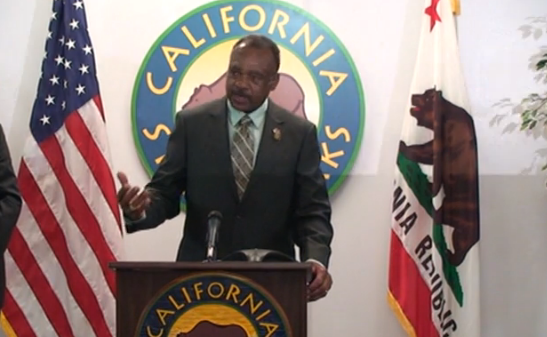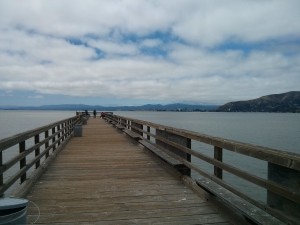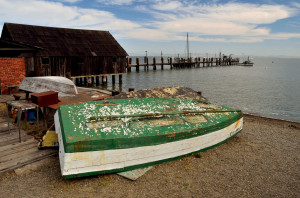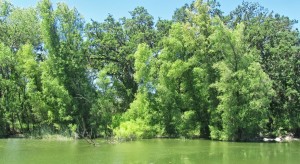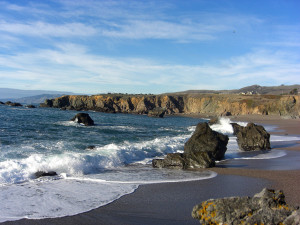Major General Anthony L. Jackson has been California’s state parks director only five weeks. But he’s already set some priorities. One is making sure that “every nickel and dime” that comes into park coffers is well managed. Another is finding new revenue sources and avoiding park closures.
“My goal, honest and truly, is not closing any parks,” he told Bay Nature in a phone interview this week, excerpted below. “I’m not under any mandate from either the Secretary of Natural Resources or the Governor to come in here and administer over closing parks.”
At 63, Jackson is a retired Marine. Over his distinguished 36-year career, he served in Afghanistan, Algeria, Germany, Iraq, Japan, Kenya, Korea, the Philippines, and various parts of the United States.
His November 16 swearing-in followed months of strife in the parks department. After a year of threatening to close 70 parks (one fourth of the state system) for lack of funds, the department admitted last summer that it had a secret surplus of $54 million. Parks director Ruth Coleman resigned. Her chief deputy, Michael Harris, was fired. Park donors and volunteers, who had donated millions of dollars and thousands of hours to rescue parks on the closure list, were outraged.
Governor Jerry Brown says he has tapped Jackson to restore “confidence and trust.” Jackson seems eager for the challenge. “I wouldn’t have come out of retirement if this place were running smoothly,” he says.
From a large military family, Jackson was captain of the football team at San Jose State University. He earned a B.A. in 1971 and an M.A. in 1973, both in history. A civil rights activist, he was one of fewer than a hundred African Americans on a campus with 24,000 students. “Race was a factor in those days,” he later told the campus magazine, Washington Square, “particularly in 1968 with the assassination of Martin Luther King, Jr.”
In 1975, Jackson enlisted in the Marines because, “I wanted to be tested in a crisis.” He planned to exit after three years, but ended up staying more than three decades.
His last military assignment turned out to be a steppingstone to the parks job. As commander of Marine Corps Installations West, Jackson ran seven bases on 160,000 acres, mostly in California, and supervised tens of thousands of troops and civilians, including 118 ecologists and other scientists and a unionized civilian police force. His main goal was military readiness. But he also had to heed state and federal laws protecting air, water, wildlife, and cultural resources. He frequently came to Sacramento to work on these issues with the governor and the state natural resources department.
“I developed a lot of team spirit,” Jackson says. “Little did I know my associations were leaving little white crumbs back to my retirement home.”
Kathryn Phillips, director of Sierra Club California, at first thought Jackson was “an odd fit” for the job. After all, he had never managed parks or held a job in state government. But after a get-acquainted lunch, Phillips changed her mind. “He has thrived in a complex organization embedded with protocol and politics. He has had to inspire people to do better, and has had to lead people to achieve a common mission,” she wrote in a blog on the Sierra Club California website. “He may be exactly the right man at the right time for our parks.”
Though colleagues call him “the General,” Jackson can come off like a regular guy. At his swearing-in, he joked, “I actually grew my hair out and got sideburns and a little mustache to settle people down that a Marine was coming in here.”
In his conversation with Bay Nature, Jackson was casual and friendly. He got to the point. He didn’t pretend to know things he didn’t know. In an age of irony and cynicism, he seemed straightforward and sincere. Here’s what he said:
Q: What should people know about your background?
A: That I’m somebody truly committed to preserving California’s natural resources. Because I was in the military for so long, I come without any political baggage, without anything but the desire to serve this state in a way that enhances the state park system, and preserves the natural and cultural resources of that system.
Q: What are the similarities between this job and the military work you’ve done?
A: U.S. Marines come with a lot of passion. They’re aware of the honor of wearing a Marine uniform and serving our nation. I find the same sort of passion in the people who work in the park system, whether it’s a ranger, a park supervisor, an archaeologist, a historian, or a person who works in the office at the headquarters.
I also see that, for most of my career, the Marine Corps prided itself in doing anything the nation asked, regardless of what funds were allocated by Congress. And I see the same thing here. I see an organization that has a rather austere budget, but people seem to be doing their jobs, smiling. They’re doing a lot with little resources. That’s another similarity.
Probably the most critical thing is, all organizations are hungry for leadership. In the military you want a good leader, you want a leader you have faith and trust in—their knowledge, their capability—and it doesn’t matter what rank. We all have a higher authority that we have to account to and we rely on.
And the parks department is the same. It’s an organization that needs good leadership that everybody can trust, that is helping create an environment for everybody to do their jobs and lead to organizational success.
Q: Do you anticipate making big changes?
A: We’re in the middle of just that kind of analysis.
I want to make sure that the park headquarters is organized to best support those people in the field and the public. I think we also have to look in the field. Are we supporting those people who meet the public, who on a daily basis make sure that the natural resources are protected, that the public is educated about those natural resources, and the public safety is ongoing?
So we are taking a look at our organization, to make sure that we have the right organizational construct. What we have might be the best already. But I think we owe it to everybody to do a good, hard analysis.
Q: When Governor Brown appointed you, he talked about restoring integrity to the parks department. What would you say about that?
A: I think that the parks have had 99.9 percent of the people honestly, faithfully doing their jobs. If the public scrutinized what was happening here, they would find that people are extremely dedicated. But the headlines point to the 0.1 percent that gives the whole organization a black eye. We had this violation of public trust, by either misusing or poorly accounting for funds. We all know that. And I’ve been telling people here to brace for the punch. As audits and investigations are completed, it’s going to come. We’ll all absorb it.
But if you take the positive side, this is the catalyst perhaps that the organization needed for positive change. I’ve already set up procedures now where my executive staff and I are looking at our budget on a weekly basis, so we’re going to be able to account for every nickel and every dime. We’re going to be able to explain it and be open to the public. If they come in and say, “I want to see what you spent last week,” we can open up those books and say, “See there, that’s your tax dollar at work.” I think we should be that kind of organization.
It’s not that we’re not going to stumble. We’re not going to be without human error. But we’re going to always be giving honest and faithful service no matter what. And 99.9 percent of the people who work for the parks are doing that now.
Q: How are you going to deal with that austerity that you mentioned?
A: Well, first of all, we’ve got to manage what we have well. No matter what that number is.
We’re also studying new revenue-generation projects to generate at the very least enough funds to do the kind of maintenance on a daily basis that people who visit our parks and historical places would expect.
We’re looking at some innovative ideas. We are not looking at turning our parks over to private enterprises or in any way disrupting the natural beauty of a beach or a forest or a waterway or anything like that. We have to strike a balance between revenue generation, access to facilities for all economic groups, and not interfering with the natural wonder.
Hopefully we can show the legislature and the governor’s office that we have a good business plan to move into the future—to do some self-generation. But we’ll also probably need some capital investment along the way.
Q: A year or two ago, the state’s idea was to cope with austerity by shutting down some parks, in the hope that would bring more resources to the parks that stayed open. What about that idea?
A: Well the legislature has already said that we’re not going to shut down any parks. We’re not even considering that between now and 2014. There’s a two-year break they’ve given us to get our revenue-generation plans under way.
We’re probably going to have to do a review at the end of 2013 to see how well we’re holding up to the goal of not closing any parks. But my goal, honest and truly, is not closing any parks. I’m not under any mandate from either the Secretary of Natural Resources or the Governor to come in here and administer over closing parks.
Q: What about interpretation? Twenty-five years ago, park rangers spent a lot of time teaching school children and others about the parks. And now there’s scarcely any money for that. Do you have any comments on that topic?
A: Every day I get my eyes opened to another great value of park systems. Outside of our public schools, our parks, our rangers, and our interpreters do more to educate children than any other institution in the state of California. So the parks are a great educational institution, a great schoolhouse.
I’m not sure what our overall status is compared to past years, but I do know that interpretation is going on in a lot of the places I’ve visited in the past few weeks. I would have to take a closer look to see how much we’ve eliminated. People haven’t brought that up as a critical issue.
Q: Do you have any anecdotes from your brief time in retirement? I understand that you bought an RV and explored California parks.
A: I retired on January 1st. My wife’s and my first goal was to see all the parks in the state of California. We really didn’t discriminate that much between state parks, national parks, county, and regional parks.
Q: That’s a big job.
A: By the end of June or July, we had 9,700 miles on the RV. We got as far north as Chico, saw both sides of the Sierra, and the ocean.
Sometimes we’d just wake up in the morning and say, where do we want to be in the evening? And we’d pull in and hook up. We let the sun wake us up and put us to sleep at night when it set. It was pretty enjoyable having that sort of freedom.
Q: Did you have a favorite park among those you visited?
A: I would hate to say I had a favorite park because then there would be 279 other places that would say, “What?!”
Q: You could make enemies, I guess.
A: One of the most stunning places I went was on our first journey. We headed up Pacific Coast Highway. We pulled into a little park. It was McGrath State Beach, which was on the closure list. And then there was another beach park a little farther down the road—a county park.
We also went up to Tahoe. This summer my son hiked the Tahoe Rim Trail and we were his sag wagon. We actually drove our RV up to 9,700 feet and rescued his little dog, who had worn through his booties. We rescued the dog, resupplied my son, lightened his load, and kept track of him.
We just kind of moseyed all summer and really took advantage of the RV.
Q: In closing, is there anything else you’d like to tell Bay Nature readers?
A: I appreciate their passion for their parks. I’m going to be working really hard to have what we in the military call “the special trust and confidence” that they expect and should receive from whoever sits in this chair as director of California state parks.
I am anxious to move us forward. I think that we have a great opportunity to take these troubles of the past and turn them into a catalyst that propels us into this great future that I see for California state parks. At the same time, I’d love to hear their ideas and have their support as we move forward. That’s grandiose in one way. But I think it’s what we’re all about in the parks department.
I know I won’t make everybody happy with every decision I make. But I’ll be making the best decision I can make with the information and money I have available. I’ll be a decisive leader for them.
More sources:
- Jackson’s official biography
Joan Hamilton is the author of “Parks and the People: Keeping California’s State Parks Alive in Hard Times,” a special supplement to Bay Nature magazine’s April 2012 issue.

